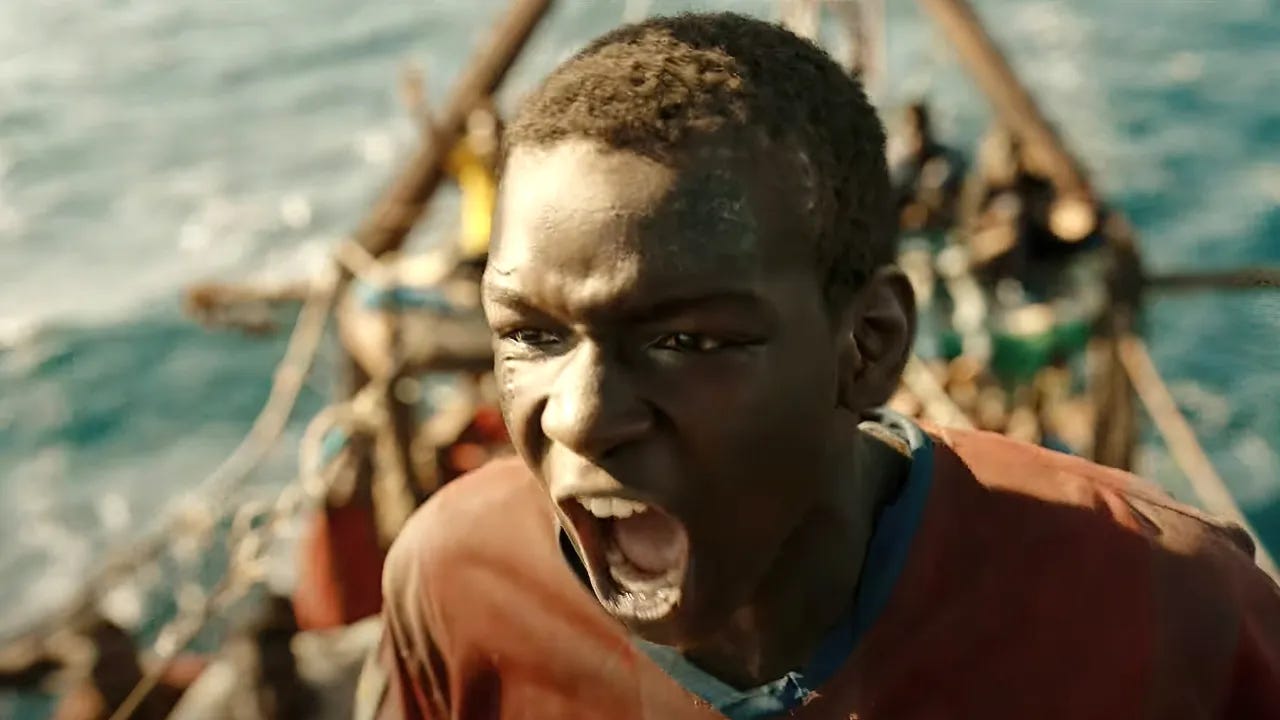Io capitano
A powerful look at the immigration crisis seen from the perspective of two Senegalese teens who undertake a harrowing journey by land and sea to reach Italy.
The issue of illegal immigration is a touchy one, and like most political spats these days has become a them-or-us violent scrum where the opposing side can’t seem to acknowledge fundamental truths. Like why people from economically depressed regions are motivated to seek out better opportunities. And why systems that superficially outlaw this but tacitly encourage it lead to mass corruption and human degradation.
It’s why we need movies like “Io capitano.”
It disengages from the heat of anger and shines a light of compassion. Though a fictional story, it’s based on actual reporting of Africa-to-Europe immigrants. Director Matteo Garrone co-wrote the screenplay with Massimo Gaudioso, Massimo Ceccherini and Andrea Tagliaferri. It has been nominated for the Oscar for best foreign language film, and deserves that honor.
It’s an Italian film but told very much from the perspective of two Senegalese teens who are trying to get to Europe. I don’t think any white Europeans even appear in the movie, with an entirely African and Arab cast. Without giving anything away, we don’t ever even see Italy, which remains as an almost mythological land of hope and freedom.
Seydou (Seydou Sarr) and Moussa (Moustapha Fall) are both 16 years old and cousins, full of irrepressible energy and that signature youthful verve that combines courage with naivete. They live with their families on the outskirts of Dakar on the western coast of Africa.
Moussa is the outgoing one, and has been pushing Seydou to come with him to Italy. They like to compose songs and sing them on street corners, and have dreams of becoming so famous white people ask them for autographs.
They’ve been sneaking off from their mothers to perform day labor work to save money. When Seydou mentions something to his mother (Ndeye Khady Sy) about going to Europe so he can send back money to help the family, she reacts with anger and fear. Most of the people who attempt that journey die, she tells him. Also she cannot imagine living someplace where they cannot breathe the same air.
Undeterred, they wind up leaving without telling anyone. The first leg of the journey on a bus seems pleasant enough, but they soon encounter myriad miscreants looking to exploit them — from gas station forgers who offers fake passports to the soldiers who easily spot them as such and demand bribes instead of arrest.
Things grow much worse in the desert. After being told they’ll be driven to Libya, they and dozens of others are dropped off halfway and must trek on foot the rest of the way. Their sole guide seems entirely unconcerned if any people can’t keep up and fall by the wayside, and indeed many do.
Seydou tries to help one older woman who falters, no doubt spurred by thoughts of his mother. His determination and imagination are brought together in a lovely scene that illuminates what a good-hearted soul he truly is.
Eventually the boys are separated and Seydou winds up in a prison. There he meets an older man, Martin (Issaka Sawadogo), who protects him and teaches him skills that will make him more useful to the jailers and slavers, and thus increase his chances of survival.
What we see as we share this journey is both uplifting, and horrifying. There are entire industries that have sprung up to make use of these immigrants from all over Africa, exploiting them for cheap labor and then taking those wages back in the form of overpriced black markets. They can’t even go to the hospitals reserved for Arabs.
Eventually Seydou’s trek takes him to the Mediterranean Sea, crammed onto a rusty old boat along with dozens of other desperate refugees. He’s placed into a position no teenager should be, for entirely cynical — but crushingly logical — reasons by the human smugglers.
Sarr is terrific in the lead role: authentic, empathetic and relatable. Though I knew Seydou was doing very wrong things — if perhaps for noble reasons — I couldn’t help feeling a tremendous amount of sympathy for him. This man/boy becomes like a knight-errant, and even if his quest is ignoble he carries it out with great perseverance.
“Io capitano” is a terrific movie because it refuses to make judgements against people like Seydou and Moussa, but simply sees them as human beings with virtues and flaws. If only we could all acknowledge such grace in each other.



